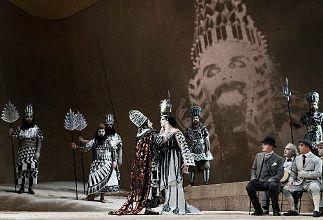Rossini - Ciro in Babilonia (Pesaro 2012)
Rossini - Ciro in Babilonia (Pesaro 2012)

Cast: Baldassare (Belshazzar) king of Babylon, Michael Spyres Ciro (Cyrus) king of Persia, Ewa Podles Amira, his wife, also pursued in love by Baldassare, Jessica Pratt Argene, her confidante, Carmen Romeu Zambri, a Babylonian Prince, Mirco Palazzi Arbace, Baldassare’s General, born in Persia –Robert McPherson The prophet Daniello (Daniel) –Raffaele Costantini Orchestra and men’s voices of the chorus of Teatro Comunale, Bologna Will Crutchfield – director Teatro Rossini, Pesaro. 16.08.2012
Ciro in Babilonia was Rossini’s first opera seria. Actually, it was performed during Lent, 1812, and the just-20-year-old composer had to call it a “dramma con cori”, or oratorio, to get it performed. It did well enough, although Rossini was not pleased with it. It was presented in many Italian cities and in Munich, Vienna, and Weimar (and in concert in London) until about 1827. It then disappeared until 1988. It’s hardly a masterpiece, but there is plenty to admire and enjoy: two lovely arias for Amira (mezzo-soprano); a duet for Amira and Baldassare (tenor); a good aria for Ciro (alto); and a fine second-act finale.
It also contains the infamous aria written entirely on the note of B-flat for a minor character, Argene (mezzo), confidante of Amira: “I had a horrible secunda donna,” Rossini told a friend. “She was not only impossibly ugly, but her voice too was beneath contempt.” He goes on to say that after “careful investigation” he realized that the B-flat above middle-C “did not sound bad”, and so that’s the note he chose. It’s fun to hear.
Rossini took the overture from L’inganno felice and a number or two from Demetrio e Publio; but these are scarcely familiar, even to the modern listener. You can skip the tedious recitatives and a pair of totally uninspired brief arias for minor characters (Daniel the prophet has a strangely jolly aria prophesying doom). So don’t expect to be dazzled, although as usual, Rossini is rarely less than entertaining.
The plot concerns Ciro, who has been defeated in battle by Baldassare, and whose wife, Amira, he has taken prisoner. Ciro also winds up being imprisoned by Baldassare, and during a feast a mysterious message appears, which the prophet Daniel claims expresses the wrath of God; Baldassare’s astrologers think it’s asking for the death of Ciro, Amira, and their child. But Babylon falls and Ciro is named King, saving the day for the good guys. --- Robert Levine, classicstoday.com
download: uploaded 4shared anonfiles mega yandex sugarsync mediafire ziddu mixturecloud








